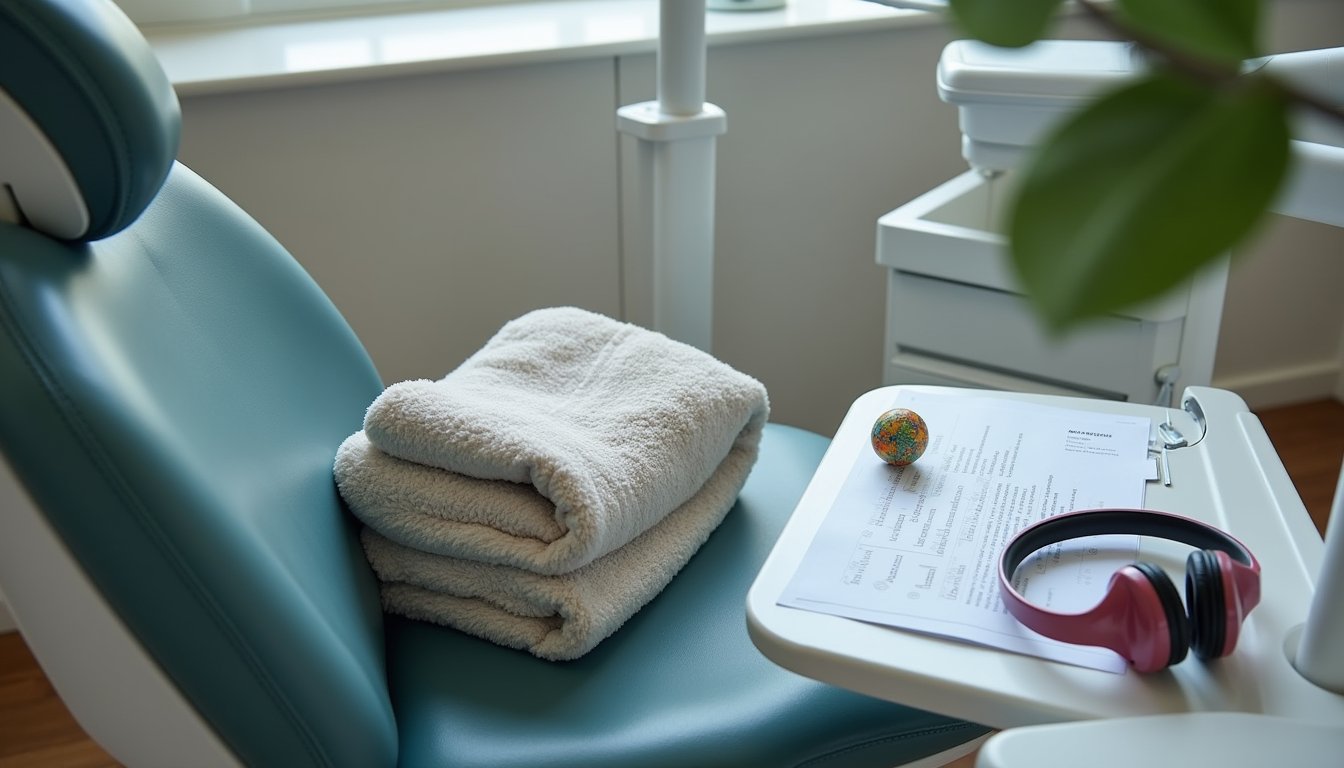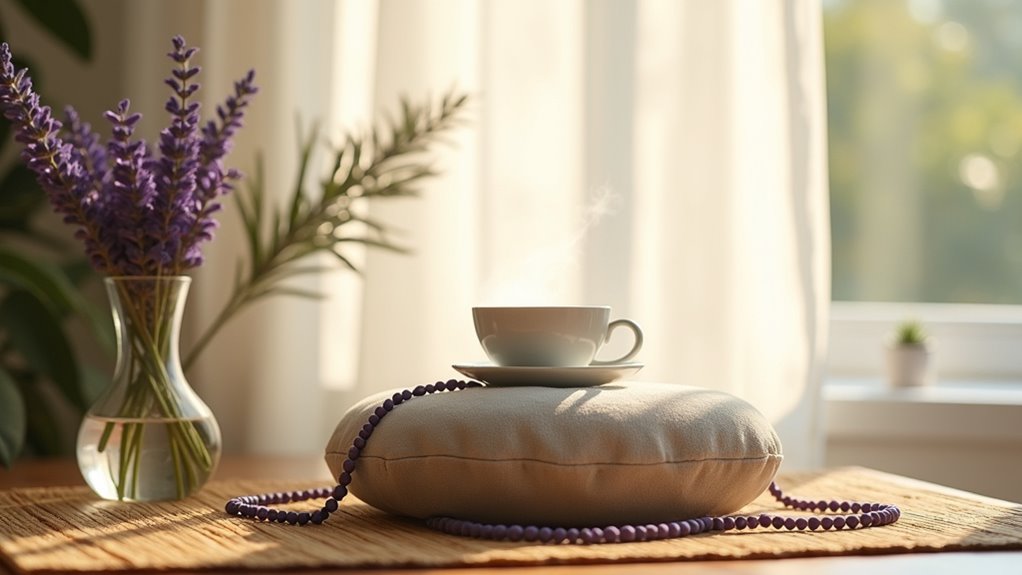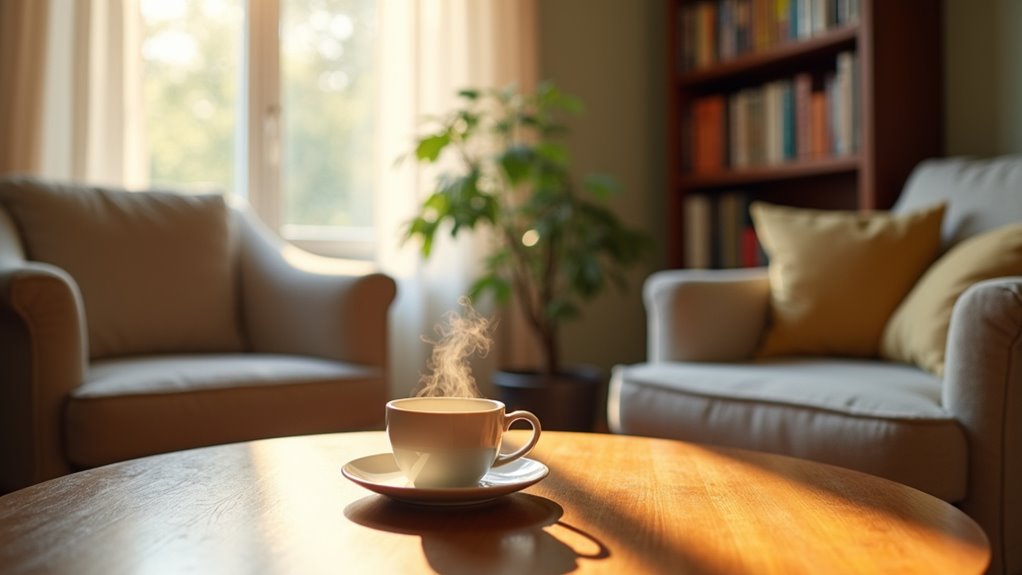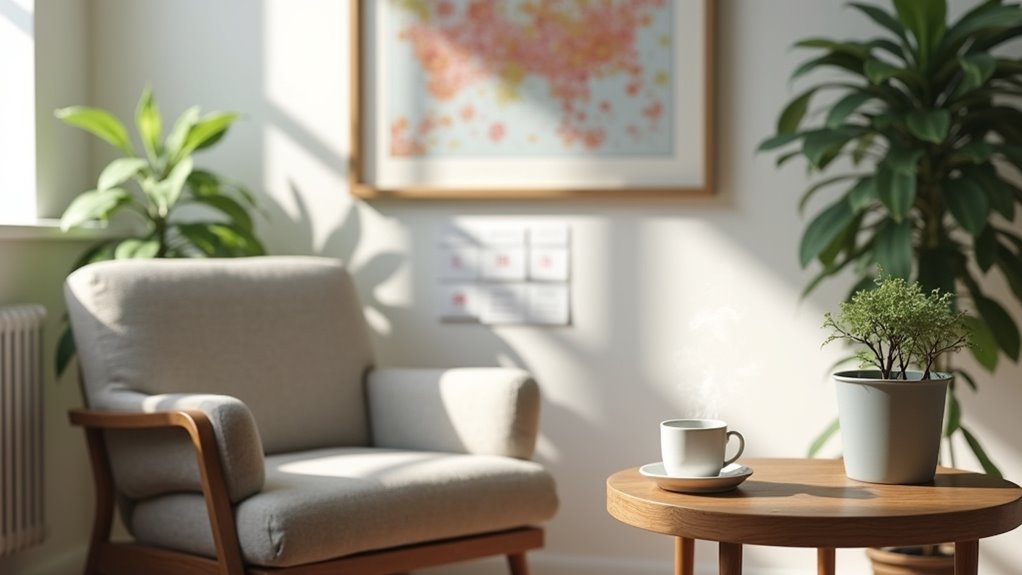You can effectively manage stress and anxiety by understanding your body’s natural response systems and implementing proven techniques. Start with simple daily practices like deep breathing exercises, mindful movement, and spending time in nature. Focus on building healthy habits through balanced nutrition, regular exercise, and quality sleep. When you’re feeling overwhelmed, keep in mind that both immediate relief and long-term resilience are achievable – let’s investigate the strategies that work best for you.
Understanding Your Body’s Stress Response

When you’re facing stress, your body launches a complex cascade of biological responses designed to help you cope with challenges. Your brain activates two main stress pathways: the sympathetic-adreno-medullar axis and the hypothalamus-pituitary-adrenal axis, which release crucial stress hormones like adrenaline and cortisol. The system maintains important functions through negative feedback loops to regulate hormone production.
These natural responses prepare you for action by increasing your heart rate, sharpening your focus, and mobilizing energy reserves. Your amygdala acts as an alert system, while your prefrontal cortex helps regulate your emotional response. Your body maintains a delicate dynamic equilibrium through these stress responses. Understanding these processes can help you recognize that your body’s reactions are normal and protective. While these responses are helpful in the short term, it’s significant to develop strategies to manage them, as prolonged activation can impact your health and well-being.
Simple Ways to Calm Your Mind Daily
You’ll find immediate relief from stress through deep breathing exercises that you can practice anywhere, anytime. When you move your body mindfully through activities like gentle walking or yoga, you’re giving your mind a natural chance to settle and reset. Spending time in natural spaces, whether it’s a local park or your backyard garden, can help you tap into a sense of calm that lasts throughout your day. Essential oils can create a soothing atmosphere that promotes relaxation and reduces anxiety levels. Making these practices a daily routine for just 20 minutes each day can significantly improve your ability to handle stress.
Practice Deep Breathing Daily
Deep breathing stands as one of the most accessible and effective tools for managing daily stress and anxiety. When you practice deep breathing, you’re engaging your diaphragm, allowing your belly to rise and fall naturally with each breath. This simple yet powerful technique helps calm your nervous system and reduce stress levels.
To get started, find a quiet, comfortable spot where you can sit or lie down. Place one hand on belly to monitor proper breathing technique. Begin with the 4-7-8 method: inhale for 4 seconds, hold for 7, and exhale for 8. You’ll notice your heart rate slowing and tension melting away. If you experience any lightheadedness, adjust the length of your breaths as needed. Try incorporating deep breathing into your daily routine perhaps before meals, during work breaks, or before bed. Even a few minutes of practice can make a significant difference in how you feel, helping you maintain better emotional balance throughout your day.
Move Your Body Mindfully
Just as deep breathing connects your mind and body, mindful movement takes this harmony to the next level. Whether you’re practicing mindful walking or exploring yoga benefits, you’re giving yourself a powerful tool to reduce stress and anxiety. You’ll notice improvements in both your emotional well-being and physical health as you become more aware of each movement. Regular mindful movement practices like tai chi and qigong have been shown to enhance your moment-to-moment awareness. Taking regular walks can help combat sedentary lifestyles while boosting both mental and physical energy.
Start your mindful movement experience with these simple approaches:
- Take a slow, intentional walk while focusing on each step and the sensations in your feet
- Try gentle yoga poses that combine breathing with movement, allowing your mind to stay present
- Practice everyday activities mindfully, like stretching or climbing stairs, paying attention to how your body feels
Connect With Natural Spaces
Nature’s healing power offers one of the most accessible and effective ways to calm an anxious mind. Whether you spend time in a local park, garden, or forest, connecting with green spaces can greatly reduce your stress levels and improve your mental well-being. Just 30 minutes a week in nature can decrease depressive symptoms by 7%. Studies show that nature exposure leads to better sleep quality for those struggling with anxiety.
Research shows that spending two hours weekly in natural environments is the minimum threshold for experiencing significant health and psychological benefits. Consider nature therapy as your daily stress-relief tool. You don’t need elaborate plans a brief walk during lunch, sitting under a tree, or tending to plants can lower your cortisol levels and blood pressure. If you live in an urban area, seek out nearby parks or community gardens. Even short nature breaks during your workday can elevate your mood and reduce anxiety. Remember, you’re not just taking a break you’re actively supporting your mental and physical health through one of life’s most natural remedies.
Natural Methods for Anxiety Relief
For those seeking relief from anxiety without prescription medications, numerous natural approaches have proven effective over time. You’ll find assorted herbal remedies like lavender and chamomile that can help calm your nerves, while aromatherapy benefits from essential oils offer quick stress relief. CBD oil supplements are increasingly studied for their potential to reduce anxiety symptoms. Mindfulness techniques combined with lifestyle adjustments, such as regular exercise and proper sleep, can greatly impact your anxiety levels. Research shows that eliminating caffeine intake can significantly improve anxiety symptoms and reduce panic attacks.
- Try calming oils like lavender or bergamot in a diffuser while practicing deep breathing exercises
- Incorporate mood-enhancing foods rich in omega-3s and natural stress relief supplements like magnesium
- Combine daily mindfulness techniques with physical activity to enhance your body’s stress management abilities
Creating Your Personal Stress Management Plan

Building on these natural approaches, developing your own personalized stress management plan can help you take control of your mental well-being. Start by conducting a thorough stress assessment to identify your specific triggers and emotional responses. You’ll want to track situations that consistently cause you distress, whether they’re work-related pressures or personal challenges. Understanding both extrinsic and intrinsic factors that affect your stress levels is crucial for effective management.
Next, set realistic, measurable goals that address both immediate relief and long-term stability. Celebrate minor improvements during your stress management journey to maintain motivation and engagement. Consider incorporating mindfulness practices, regular exercise, and time management techniques into your daily routine. Remember to maintain goal tracking to monitor your progress and make necessary adjustments. Don’t hesitate to lean on your support network or seek professional guidance when needed. Your plan should be flexible enough to evolve as you uncover what works best for you.
Building Resilience Through Lifestyle Changes
In regard to strengthening your mental resilience, making strategic lifestyle changes can create a powerful foundation for long-term emotional well-being. By focusing on healthy habits and community involvement, you’ll develop the tools needed to better handle life’s challenges. Start with simple changes like maintaining a balanced diet, getting regular exercise, and ensuring adequate sleep. Keep in mind that connecting with others through support groups or volunteer activities can greatly enhance your resilience and provide valuable emotional support. Remember that resilience can develop through consistent practice and conscious effort over time.
Building mental strength requires deliberate lifestyle changes, from healthy daily habits to meaningful community connections that support emotional growth.
- Join local community groups or online forums to build meaningful relationships with people who share your interests
- Establish a consistent routine that prioritizes nutrition, physical activity, and proper rest
- Practice mindfulness techniques and positive thinking to reframe challenges as opportunities for growth
The Power of Mindful Living

While modern life bombards us with constant distractions and pressures, mindful living offers a powerful antidote to chaos and stress. You’ll find that incorporating mindfulness into your daily routine through practices like mindful eating and mindful communication can greatly reduce anxiety while improving your mental clarity and emotional balance.
| Practice | Benefits | Daily Application |
|---|---|---|
| Breath Focus | Reduces stress, lowers blood pressure | Morning meditation, traffic delays |
| Body Scanning | Improves sleep, releases tension | Bedtime routine, desk breaks |
| Present Awareness | Improves focus, reduces worry | Mindful eating, nature walks |
| Compassionate Response | Strengthens relationships, decreases reactivity | Mindful communication, self-talk |
When and How to Get Expert Support
If you’re experiencing persistent worry that disrupts your daily life or finding it harder to cope with stress, you’re among the many who could benefit from professional support. You’ll want to look for a licensed therapist who specializes in anxiety and makes you feel comfortable sharing your concerns, whether through in-person sessions or convenient online platforms. From traditional cognitive-behavioral therapy to medication options, mental health professionals can help you create a personalized treatment plan that fits your needs and circumstances.
Signs You Need Help
Living with anxiety can feel overwhelming, especially when you’re unsure whether your symptoms warrant professional help. When recognizing triggers becomes difficult and your daily life is greatly impacted, it’s time to reflect on seeking support from a mental health professional.
Key signs that indicate you need help include:
- Your anxiety persistently interferes with work, relationships, or daily activities for more than two weeks
- You’re experiencing physical symptoms like chronic sleep issues, unexplained pain, or frequent illnesses
- You’ve started using unhealthy coping mechanisms, such as substance abuse or social isolation
Finding the Right Therapist
Choosing the right therapist can feel like traversing a complex maze, but you don’t have to tackle this expedition alone. Begin by clarifying your needs and identifying what you’d like to achieve through therapy. Whether you’re dealing with anxiety, depression, or seeking personal growth, understanding your goals will help narrow down potential matches.
Consider therapist compatibility by evaluating their specializations, therapy modalities, and treatment approaches. You’ll want someone who’s not merely qualified but also clicks with your personality and communication style. Don’t hesitate to ask for recommendations from trusted friends or healthcare providers, and always verify credentials and insurance coverage. Schedule initial consultations to assess the fit you should feel comfortable and supported. Remember, finding the right therapist is an investment in your well-being, and it’s perfectly okay to take your time making this significant decision.
Options for Mental Care
Once you’ve identified a potential therapist, it’s valuable to understand the full spectrum of mental health support available to you. Mental health professionals come with different specializations and approaches, from psychiatrists who can prescribe medication to psychologists and counselors who focus on a range of therapy options. You’ll find different types of support that can match your specific needs and comfort level.
- Licensed Clinical Social Workers (LCSWs) and Mental Health Counselors often provide more affordable therapy options while maintaining high-quality care
- Digital services, including online therapy platforms and support groups, offer flexible alternatives when in-person sessions aren’t practical
- Crisis services are available 24/7 through hotlines and text support if you need immediate assistance
Frequently Asked Questions
Can Stress and Anxiety Symptoms Vary Between Different Age Groups?
Yes, stress symptoms and anxiety triggers can greatly differ based on your stage of life. If you’re a young adult (18-24), you’re more likely to experience intense anxiety and stress compared to older demographics. While younger people often face triggers like academic pressure and social concerns, older adults typically show more resilience due to developed coping skills. However, financial worries and life changes can trigger stress across all stages of life.
How Do Seasonal Changes Affect Stress and Anxiety Levels?
Imagine Sarah, who notices her anxiety peaks every winter when daylight hours shrink. You’re not alone if you experience similar patterns seasonal changes greatly impact stress and anxiety levels. Environmental factors like reduced sunlight and weather shifts can trigger seasonal affective symptoms, disrupting your sleep patterns and mood. Your body’s natural rhythms respond to these changes, potentially leading to increased stress, while shorter days can affect your serotonin levels and emotional well-being.
Are Anxiety-Related Feelings Hereditary or Influenced by Family History?
Your anxiety-related feelings can be influenced by both genetic predisposition and family environment. Research shows that genetics account for about 30-40% of anxiety risk, with multiple genes playing a role rather than a single “anxiety gene.” You’re also more likely to experience anxiety if close family members have it, as it can be passed down through both inherited traits and learned behaviors within your family setting.
Do Different Cultures Experience and Express Stress and Anxiety Differently?
Yes, cultural expressions of stress and anxiety vary considerably across different societies. You’ll find that what’s considered stressful and how people show their anxiety differs based on cultural background. For example, some cultures might express anxiety through physical symptoms, while others focus on emotional descriptions. Your stress management approach may be influenced by your cultural beliefs, including whether you prefer traditional healing practices or modern therapeutic methods.
Can Certain Medications or Supplements Worsen Anxiety Symptoms?
Just as mixing the wrong ingredients can turn a perfect recipe into a disaster, certain medications and supplements can intensify your anxiety symptoms. You’ll find that medication interactions can greatly impact your mental well-being – common culprits include stimulants, corticosteroids, and some asthma medications. Even seemingly harmless supplements might affect supplement efficacy and worsen anxiety. It’s essential that you discuss any medications or supplements with your healthcare provider to confirm they’re working together safely
















